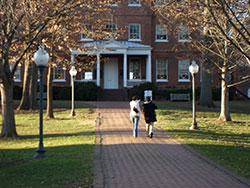CollegeSuccessAdvice.com
College advice for adults - without the sales pitch
Types of Colleges
I'll never forget my first attempt at buying crabs. I wanted real crabs - big, fat, live ones - not just a bunch of legs from the supermarket. Although I'd been eating crabs for years, I'd never bought or cooked any myself. Resolute, and starving, I found a seafood market and went right up to the counter.
Then I froze.
The sign outside promised "crabs r here" but the bulletin board inside might as well have been written in Greek: Jimmies, #2 males, #3 females, and on and on it went. I was hungry, but I had no idea whether a dozen #2 crabs would fit the bill. And why were they selling crabs named Jimmy?
If you've been researching higher education for any length of time, you probably feel like I did that day. You're probably amazed at all the different types of institutions clamoring for your attention. Narrowing your choices will be much easier if you understand the different types of colleges and the degrees they offer.
Universities
A university is simply a large higher education institution. Think of a sprawling campus with several dormitories, a football stadium, and a row of fraternity houses.

A university can also contain one or more colleges. I hope that didn't just blow your mind. Even more confusing: these colleges within the university are sometimes referred to as schools.
An example will help: Look at the University of Virginia's homepage. Click the Schools tab and you'll see that this university is comprised of the School of Medicine, School of Law, the Darden School of Business, and many others. A University of Virginia nursing student wouldn't go over to their Darden School of Business to see his physiology professor. His professor would be located in the School of Nursing.
Here's another example of a large university containing several different colleges/schools: Harvard University
Make sense so far? I know, clear as mud. Let's keep going.
Colleges

A college is smaller than a university. Keep in mind that we're not talking about something like the University of Virginia's School of Nursing. No, here we're talking about a single, stand-alone institution, such as St. John's College in Annapolis, Maryland.
Colleges are not only smaller than universities, they usually have a tighter focus. For example, St. John's is a liberal arts college - its program concentrates on fields like literature, philosophy, history, and other similar areas. Don't apply to a liberal arts college if you want an engineering degree.
Other types of colleges include:
- Technical
- Vocational
- Community College
This is where you'd earn your engineering, math, chemistry, physics, or other scientific degree.
Vocational colleges provide job skills training; they are highly specialized. You could attend a vocational college to become a welder, for example.
Don't confuse a vocational college with a professional degree program (e.g., medical or law school) at a university, liberal arts, or technical college. Because of accreditation differences, the credits you earn at a vocational college won't necessarily count towards a two- or four-year degree later on. Vocational colleges differ widely, so make sure a vocational school fits your goals before you attend one.
Community colleges are generally smaller than the institutions we've looked at so far, although they offer a wide variety of programs. From engineering to art, you can probably study it at your local community college - it's a shame more people don't take advantage of these programs.
So which one's better for me?
My answer is: "it depends." If you already have some college under your belt, you should probably go with a university or college (i.e., liberal arts college, etc.).
If you've never attended college and money's tight (an understatement these days), here's a helpful strategy to start you off: a lot of community colleges partner with the four-year institutions within their state. That means you can take history courses at a state community college, earn an Associate of Arts in History, then transfer all those courses to one of that state's colleges or universities and continue on to earn your Bachelor of Arts in History degree. Do the first two years at community college, then you'd only have two years at university to finish your bachelor's. How cool is that?
I know that was a lot of information, but all this preparation will pay off. You'll be head-and-shoulders above your classmates who just filled out an application without researching this stuff. They'll be the ones who didn't know they were required to take a placement test before signing up for any math courses, or that they had to submit transcripts from their former schools; let's make sure none of that will happen to you!
Now that we can tell the difference between all the institutions out there, let's discuss accreditation.